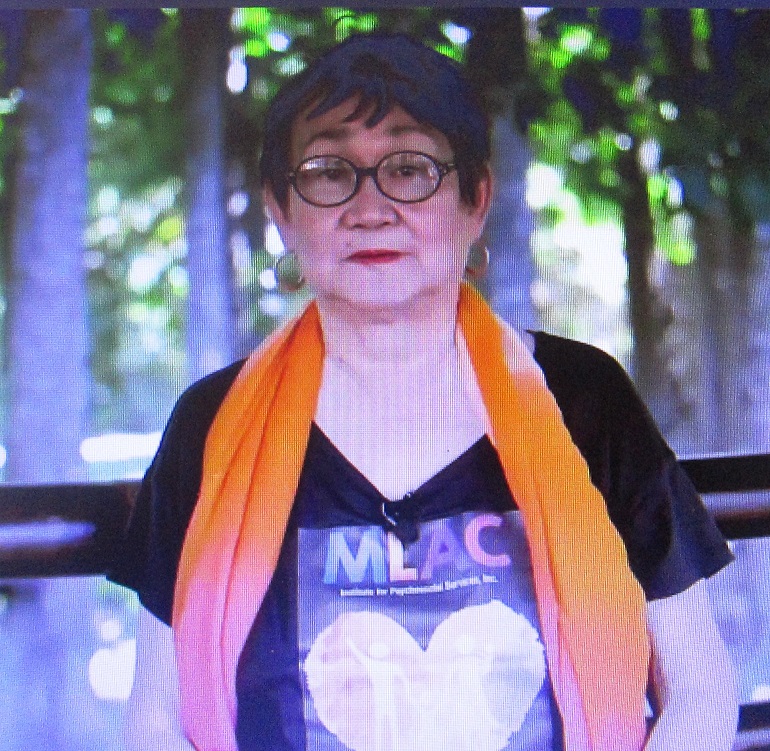What is the first thing you reach for when you wake up in the morning? Is it your cell phone? Then do you quickly scroll down your news feed?
Apparently, this common practice in the digital age is something that must be unlearned, National Social Scientist Lourdes “Honey” A. Carandang said. “If you get the phone, you’re not centered anymore.”
Instead, the psychologist-founder of the Mindfulness Love and Compassion (MLAC) Institute of Psychological Services Inc. recommended that a person put up his/her leg one after the other mindfully before grabbing the phone.
Speaking at a Zoom webinar on “Finding Joy and Hope in the Time of Coronavirus” on the occasion of her 77th birthday and the 10th anniversary of MLAC, she said kindness to one’s self radiates into kindness towards others.
She cited a case she handled of a depressed, suicidal adolescent who felt ostracized from her classmates. One day, the girl felt joy when, for the first time, said classmates laughed at one of her jokes.
Another way of applying kindness is “with little things in ordinary life,” Carandang said. For example, when a delivery man intrudes on your time, you don’t curtly say, “Ilagay mo na lang diyan (Just put it there).” Instead, she said, you could say, “Pakilagay na lang diyan, Manong. Salamat (Please put it there, Manong. Thank you)!”
Or you can practice mindful parenting.When a child is running around the house and screaming angrily, you don’t react by saying, “Stop the screaming! What’s wrong with you?”
Instead, she suggested that you pause and say, “Hey, wait. You’re hurting my ears. Come here” Then you hold the child comfortingly and ask, “Please stop screaming. What is happening?” By doing so, the psychologist said, “you behaved with kindness and love.”
She quoted Viktor Frankl, the Austrian Holocaust survivor, neurologist and psychiatrist, as saying, “We have the freedom to choose the inner spirit, no matter what the outside circumstances are. Between the stimulus and the response is space—your own freedom to choose your spirit, your freedom to choose your own response.”
She added, “Every time we catch ourselves going down the rut of habitual reaction, we have the chance to interrupt the momentum, to pause and discover a whole new direction and depth to our lives.”
Carandang led the webinar attendees through a three-minute exercise in meditation or what she called going into “the sacred quiet, the space within yourself and where you can connect with your basic goodness.” She asked them to close their eyes and pay attention to their breathing, a way of staying in that sacred space.
In Zen meditation, westerners strike the bell.But easterners are different, she said. It’s “let us invite the bell.” She enjoined the listeners to “stay there, enjoy it until the bells rings, then gently, slowly open your eyes.”
She said the COVID-19 pandemic has become a season of grief, helplessness and hopelessness. “On the other hand,” she continued, it has also been an occasion for “a million acts of kindness, a million acts of love.”
She called the pandemic as a reason to “look into ourselves, know what really matters and what kind of life you want to live.”
She quoted her friend from the Mind Museum who texted her stating, “Twentytwenty will soon be one word. Just one word that will mean ‘an avalanche of sorrow where we all have to find soul shovels to dig deep for our own sources of joy.’”
The famed Vietnames Buddhist monk Thich Nhat Hanh was also quoted as saying:
“The source of love is deep in us.
We can help realize a lot of happiness—
One word, one action, one thought
Can reduce another person’s suffering
And bring that person JOY.”
When asked if people who were used to productivity and were suddenly displaced by the pandemic into a situation of enforced idleness could regain their self-esteem again, Carandang answered that she herself was guilty of wanting to do things fast and finish everything on time. “But,” she said, “when I slowed down and paused to catch my breath for two to three minutes, the productivity and quality of work became better. I believe that if you pause when you are tired, you gain time, you do things more joyfully, and the quality is better.”
In managing anger, she suggested that it is best to “pause and breathe, to do something to stop the momentum before you reach the point of no return.” Sometimes that doing something is as simple as just snapping your finger hard.
Other gestures of centeredness in a day are doable and can include taking a mindful shower wherein you feel the warm water streaming on your back or you feel the soap in your hand and taking a mindful breakfast.
